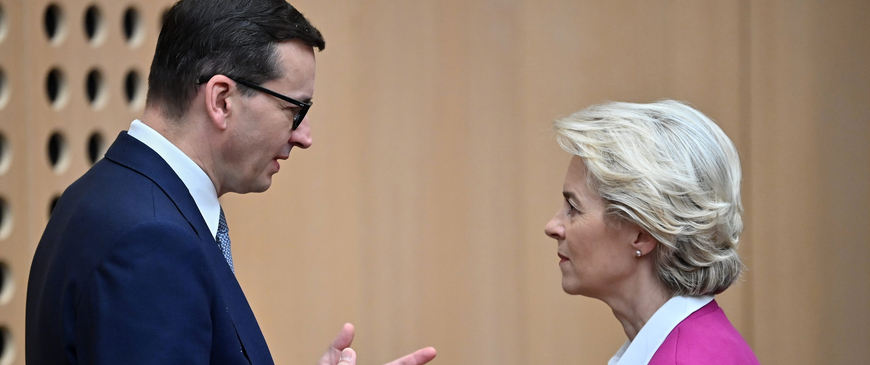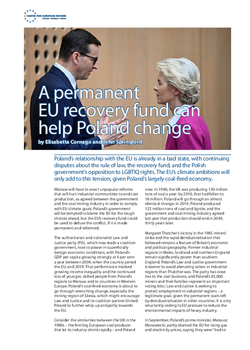
A permanent EU recovery fund can help Poland change
Poland’s relationship with the EU is already in a bad state, with continuing disputes about the rule of law, the recovery fund, and the Polish government’s opposition to LGBTIQ rights. The EU’s climate ambitions will only add to this tension, given Poland’s largely coal-fired economy.
Warsaw will have to enact unpopular reforms that will hurt industrial communities to end coal production, as agreed between the government and the coal mining industry in order to comply with EU climate goals. Poland’s government will be tempted to blame the EU for the tough choices ahead, but the EU’s recovery fund could be used to defuse the conflict, if it is made permanent and reformed.
The authoritarian and nationalist Law and Justice party (PiS), which now leads a coalition government, rose to power in superficially benign economic conditions, with Poland’s GDP per capita growing strongly at 4 per cent a year between 2004, when the country joined the EU, and 2019. That performance masked growing income inequality and the continued loss of younger, skilled people from Poland’s regions to Warsaw and to countries in Western Europe. Poland’s coal-fired economy is about to go through wrenching change, especially the mining region of Silesia, which might encourage Law and Justice and its coalition partner United Poland to further whip up antipathy towards the EU.
Consider the similarities between the UK in the 1980s – the first big European coal producer that let its industry shrink rapidly – and Poland now. In 1980, the UK was producing 130 million tons of coal a year: by 2010, that had fallen to 18 million. Poland will go through an almost identical change: in 2019, Poland produced 122 million tons of coal and lignite, and the government and coal mining industry agreed last year that production should end in 2049, thirty years later.
Margaret Thatcher’s victory in the 1985 miners’ strike and the rapid deindustrialisation that followed remains a feature of Britain’s economic and political geography. Former industrial regions in Wales, Scotland and northern England remain significantly poorer than southern England. Poland’s Law and Justice government is keener to avoid alienating voters in industrial regions than Thatcher was. The party has close ties to the coal business, and Poland’s 83,000 miners and their families represent an important voting bloc. Law and Justice is seeking to protect employment in industrial regions – a legitimate goal, given the permanent scars left by deindustrialisation in other countries. It is only reluctantly ceding to EU pressure to reduce the environmental impacts of heavy industry.
In September, Poland’s prime minister, Mateusz Morawiecki, partly blamed the EU for rising gas and electricity prices, saying they were “tied to the EU’s climate policies”. Poland has refused to close a lignite mine on the border with Czechia that may be illegally drawing groundwater from Czechia’s territory, despite being ordered by the European Court of Justice to close it in May 2021. Poland’s Energy Plan published in March 2021 entails fairly limited cuts in coal-fired electricity generation in the 2020s, postponing most action to the 2030s.
Over the last two decades, money from the EU budget has helped reduce pollution and improve the energy efficiency of the Polish economy by closing dirty plants and improving infrastructure. The recovery fund, set up in 2020 to help EU member-states overcome the COVID-19 crisis, requires 37 per cent of the money to be spent on climate investment, such as renewable energy, energy-efficient building renovations and charging stations for electric vehicles. As a result of the standoff with the Polish government over its politicisation of the judiciary, the Commission has so far refused to sign off Poland’s plans for recovery fund spending, which would provide €14 billion for improvements to energy efficiency and infrastructure, and €7.5 billion for greening transport.
With grants from the recovery fund amounting to 0.7 per cent of GDP a year for six years, it would be surprising if Poland did not eventually compromise. However, for now, Law and Justice appear to have decided on a course of confrontation with the EU, with Morawiecki threatening to veto the adoption of the Commission’s proposed Fit for 55 climate package if Poland's recovery plan is not agreed.
The EU’s hawkish north could conclude that the recovery fund means throwing money at a recalcitrant east and spendthrift south, and that it would be best if it were a one-off, ruling out a permanent EU fiscal union focused on investment. That would be a mistake. In a recent CER policy brief, 'Why the EU's recovery fund should be permanent', we argue the recovery fund should be extended beyond 2026, and provide much stronger incentives for Poland and other laggards to overcome the difficult domestic politics that they face in relation to the energy transition.
By making the recovery fund permanent, the EU would be providing a constant stream of investment for the climate transition, which will of course continue long after the fund’s current end year of 2026.
By making the recovery fund permanent, the EU would be providing a constant stream of investment for the climate transition, which will of course continue long after the fund’s current end year of 2026. Public investment was the biggest victim of the austerity round of the 2010s, because it is easier to cut future spending than raising taxes or taking money from welfare, pensions or public services. But it was one of the worst budget lines to cut: public investment stimulates private investment, especially when economies are weak. A permanent fund could help ensure that public investment across Europe is more stable across the economic cycle, rather than being cut in downturns.
The recovery fund as it stands today, however, is too small to move the dial on climate change: the Haut Conseil pour le Climat, an independent advisory body to the French government, estimates that France’s recovery plan will reduce emissions by less than 1 per cent compared to 2020 levels. As discussed in our policy brief, total spending on climate under the fund will be around €45 billion a year across the EU. According to the EU and member-states’ estimates, public investment on climate will have to reach approximately €460 billion a year across the EU to meet 2030 emissions targets. If climate investment through the recovery fund made up half of that annual expenditure – €230 billion – it would reduce the cost of climate action, by providing grants and cheap finance to more indebted or less developed member-states. Richer member-states are responsible for more historical emissions, so transfers are justified. And a bigger, permanent fund would provide powerful incentives for climate-sceptic or short-termist governments to act. A larger prize may also provide the Polish government with fewer incentives for confrontation with the EU on the rule of law.
The recovery fund’s governance arrangements make it much less susceptible to the mis-spending and, in some cases, outright corruption that has dogged the EU budget.
The recovery fund’s governance arrangements make it much less susceptible to the mis-spending and, in some cases, outright corruption that has dogged the EU budget. Alongside investments, member-states’ recovery plans include proposals for domestic reforms, such as digitising public services, accelerating permits for wind and solar farms, and speeding up civil cases in the courts, which should raise economies’ growth potential. Money only starts flowing when the Commission is satisfied with the government’s spending plans, including the quality of the institutions that prevent fraud and abuse, such as the judiciary. The Commission can stop money transfers if periodic reform and investment milestones are not met.
2026 may seem far off, but the climate emergency will dominate at least the next three decades of European politics. Climate change may become the next front in the long battle between nationalist and pro-EU governments. The EU’s leaders should start work on a permanent recovery fund before it is too late.
Elisabetta Cornago is a research fellow and John Springford is deputy director of the CER.

